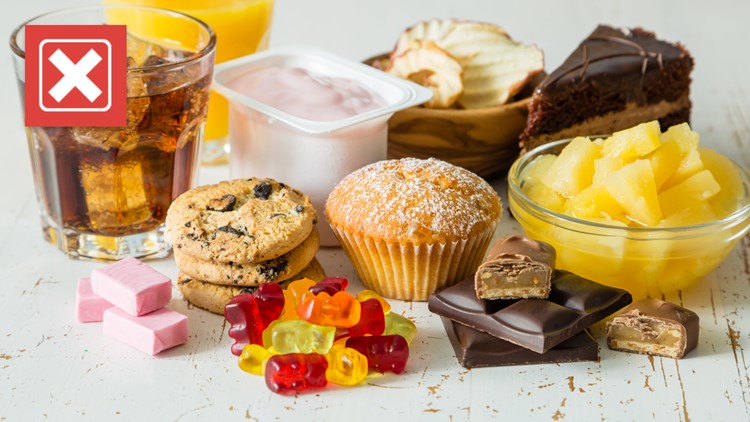Parents often refrain from giving their kids sweets to keep them from being too hyper and getting a “sugar high” or “sugar rush.”
The idea is that after a child eats or drinks something high in sugar, they become highly energetic in a short period of time. This claim has been a topic of discussion for many years, stemming from a diet plan created in the 70s.
VERIFY viewer Susan reached out through our website to ask if “sugar highs” are real.
THE QUESTION
Can eating too many sweets cause a “sugar high"?
THE SOURCES
- A study published in Neuroscience & Biobehavioral Reviews
- A study published in the International Journal of Food Sciences and Nutrition
- A study published in the New England Journal of Medicine
- A study published in the Journal of Abnormal Child Psychology
- Sabiha Kanchwala, M.D., Loma Linda University Health
- The Academy of Nutrition and Dietetics
- Centers for Disease Control and Prevention (CDC)
- American Heart Association
- Yale Scientific blog post
THE ANSWER
No, eating too many sweets doesn’t cause a “sugar high.” Research has shown situational factors, not sugar, could be to blame for hyperactive behavior.
WHAT WE FOUND
There’s no link between consuming sugar and the hyperactivity known as a “sugar high,” according to years of research.
The idea of a “sugar high” stems from a diet plan devised by Benjamin Feingold, M.D., in 1973, according to a blog post from Yale Scientific. The Feingold diet “advocated the removal of food additives, such as dyes and artificial flavors, from children’s diets because they might lead to hyperactivity.”
Since then, over a dozen studies have proven this claim to be untrue.
A study published in the New England Journal of Medicine in 1994 studied two age groups of children and found that sugar did not impact their behavior.
Another study published in 2017 in the International Journal of Food Sciences and Nutrition sampled 287 children. Nearly 80% of the children exceeded the recommended daily sugar intake limit, however, no correlation was found between their sugar intake and behavioral or sleep problems.
An analysis of 31 studies found no conclusion on whether carbohydrates, including sugars, had an impact on mood, but did find that consuming carbohydrates was associated with “higher levels of fatigue and less alertness” compared to those who did not eat or drink carbs in the study. The review’s authors wrote that their findings “might be used to increase the public's awareness that the ‘sugar rush’ is a myth.”
There can, however, be a few explanations for parents who believe their child has “sugar highs.” The Academy of Nutrition and Dietetics said the environment the child is in, rather than the food itself, could be causing the high-energy behavior. For example, at a birthday party, a child may be hyperactive out of the excitement of being with their friends, not because they consumed sugary items like cake.
Parents may also falsely expect a “sugar rush” to happen. A study in the 1990s followed two groups of children and their mothers. They told one group that their kids were given large doses of sugar, however, neither group of kids were actually given any sugar. Despite this, the mothers in the group still claimed their kids displayed hyperactivity. The study noted that these mothers displayed more controlling behavior during the experiment, so it's possible their parenting style played a part in the result.
There also is a possibility another dietary item is causing hyperactivity. Caffeine can “prevent drowsiness, cause restlessness, increase heart rate, and cause other side effects,” Sabiha Kanchwala, M.D., says in a Loma Linda University Health blog post. Sweet treats like chocolate contain small amounts of caffeine, so this could contribute to the idea that it's a “sugar high,” when a child is actually reacting to a different ingredient.
Hyperactivity could also be caused by a child’s bedtime habits. “One of the biggest factors for a patient's hyperactivity is lack of sleep,” Sabiha Kanchwala, M.D., wrote. She recommends that children get anywhere from 10-12 hours of sleep and that teens get 8-10 hours.
Some children may also have the chronic condition Attention Deficit Hyperactivity Disorder (ADHD). According to the Centers for Disease Control, millions of children have been diagnosed with ADHD, and symptoms can include hyperactivity.
Although children don’t experience “sugar highs,” too much sugar can lead to serious health problems, like cardiovascular disease or diabetes. It is important to keep in mind recommended daily intake limits. The American Heart Association recommends that children and teens consume less than six teaspoons of added sugar daily.



